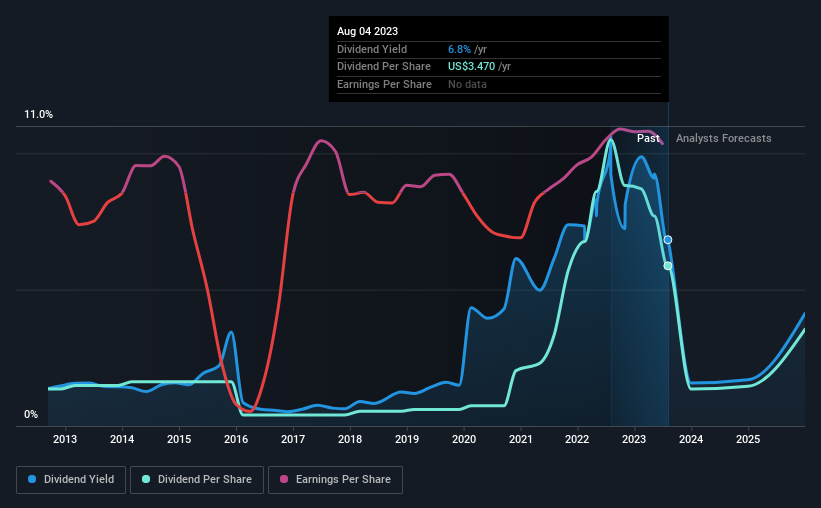Devon Energy (NYSE:DVN) Is Reducing Its Dividend To $0.49
Devon Energy Corporation's (NYSE:DVN) dividend is being reduced from last year's payment covering the same period to $0.49 on the 29th of September. However, the dividend yield of 6.8% is still a decent boost to shareholder returns.
View our latest analysis for Devon Energy
Devon Energy's Dividend Is Well Covered By Earnings
While it is great to have a strong dividend yield, we should also consider whether the payment is sustainable. Prior to this announcement, Devon Energy's dividend was only 61% of earnings, however it was paying out 210% of free cash flows. The company might be more focused on returning cash to shareholders, but paying out this much of its cash flow could expose the dividend to being cut in the future.
Over the next year, EPS is forecast to fall by 17.5%. Assuming the dividend continues along recent trends, we believe the payout ratio could be 67%, which we are pretty comfortable with and we think is feasible on an earnings basis.
Dividend Volatility
The company's dividend history has been marked by instability, with at least one cut in the last 10 years. The dividend has gone from an annual total of $0.80 in 2013 to the most recent total annual payment of $3.47. This works out to be a compound annual growth rate (CAGR) of approximately 16% a year over that time. Despite the rapid growth in the dividend over the past number of years, we have seen the payments go down the past as well, so that makes us cautious.
The Dividend Looks Likely To Grow
With a relatively unstable dividend, it's even more important to evaluate if earnings per share is growing, which could point to a growing dividend in the future. Devon Energy has impressed us by growing EPS at 49% per year over the past five years. The company doesn't have any problems growing, despite returning a lot of capital to shareholders, which is a very nice combination for a dividend stock to have.
In Summary
In summary, dividends being cut isn't ideal, however it can bring the payment into a more sustainable range. While the low payout ratio is a redeeming feature, this is offset by the minimal cash to cover the payments. We would probably look elsewhere for an income investment.
It's important to note that companies having a consistent dividend policy will generate greater investor confidence than those having an erratic one. Still, investors need to consider a host of other factors, apart from dividend payments, when analysing a company. To that end, Devon Energy has 4 warning signs (and 2 which shouldn't be ignored) we think you should know about. If you are a dividend investor, you might also want to look at our curated list of high yield dividend stocks.
Have feedback on this article? Concerned about the content? Get in touch with us directly. Alternatively, email editorial-team (at) simplywallst.com.
This article by Simply Wall St is general in nature. We provide commentary based on historical data and analyst forecasts only using an unbiased methodology and our articles are not intended to be financial advice. It does not constitute a recommendation to buy or sell any stock, and does not take account of your objectives, or your financial situation. We aim to bring you long-term focused analysis driven by fundamental data. Note that our analysis may not factor in the latest price-sensitive company announcements or qualitative material. Simply Wall St has no position in any stocks mentioned.

 Yahoo Sports
Yahoo Sports 
